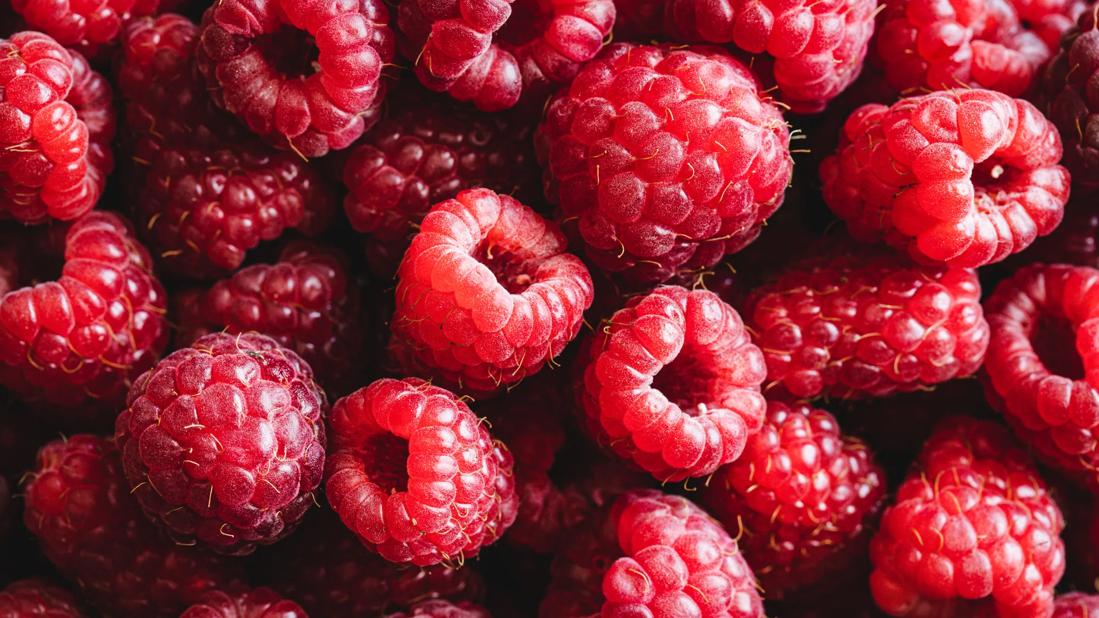Raspberries are packed with nutrients that can reduce inflammation and prevent chronic diseases

Image content: This image is available to view online.
View image online (https://assets.clevelandclinic.org/transform/e77d74a1-b23b-4ae0-8dda-fe1e85bbd86e/raspberries-1263891766)
A pile of raspberries up close and viewed from the top down
Raspberries are sweet, tart and soft — and they come in more colors than just red. You’ll also find purple, gold and black varieties (which resemble blackberries, but aren’t). Look closely, and you’ll notice raspberries are clusters of smaller fruits called drupelets, each with its own seed.
Advertisement
Cleveland Clinic is a non-profit academic medical center. Advertising on our site helps support our mission. We do not endorse non-Cleveland Clinic products or services. Policy
“Many berries, including raspberries, are considered superfoods,” says registered dietitian Sereen Zawahri Krasuna, RD, LD. “They’re packed with nutrients and offer lots of health benefits as part of a balanced diet.”
Zawahri Krasuna breaks down the health benefits of raspberries — and shares tips for adding more to your meals.
Yes, raspberries are packed with antioxidants, which help protect your body from damage.
“Antioxidants are powerful defenders against free radicals that damage your cells,” Zawahri Krasuna explains. “Oxidative stress from free radicals is linked to inflammation, aging and chronic disease.”
Also, the dense fiber found in raspberries helps promote a healthy gut and regulate bowel movements.
In just one cup, raspberries deliver a powerful nutritional punch. They’re rich in fiber, vitamin C and manganese — plus they’re naturally low in calories, fat and sugar. Here’s what you’ll get in a cup of raw raspberries:
Raspberries are also low in calories and naturally low in fat, sodium and cholesterol. In fact, a cup of raspberries has only:
Advertisement
The nutritional content of raspberries translates to a wide range of health benefits:
Raspberries are loaded with polyphenols — plant compounds that help reduce chronic inflammation.
“Inflammation is part of healing,” Zawahri Krasuna notes, “but if it sticks around too long, it can lead to serious health issues.”
The key anti-inflammatory players in raspberries are anthocyanins (which give them their rich color) and ellagitannins, especially high in black raspberries. These compounds may help protect your cells over time.
Thanks to their high fiber and low sugar, raspberries have a low glycemic index — meaning they help prevent spikes in blood sugar.
“Low glycemic foods break down slowly,” says Zawahri Krasuna. “That helps you feel full longer and keeps your blood sugar steady.”
Raspberries also contain anthocyanins, which may improve how your body uses insulin. Some research suggests these compounds could help prevent diabetes or improve blood sugar management in people who already have it.
“New research suggests that drinking raspberry leaf tea might be a simple, natural way to help control blood sugar levels after eating sugar,” Zawahri Krasuna highlights.
Some early research suggests that black raspberries may help slow the growth of colorectal cancer. In one small study, people who consumed freeze-dried black raspberry powder showed signs of:
“Scientists are still exploring how black raspberries might support cancer care,” emphasizes Zawahri Krasuna. “But we do know that eating more plant-rich foods can help lower your overall cancer risk.”
The antioxidants in raspberries — including vitamin C, anthocyanins and ellagitannins — may help protect your heart. They’ve been linked to:
Raspberries are good for your brain, too. That’s because brain cells are especially vulnerable to inflammation and oxidative stress — two processes linked to neurological conditions like Alzheimer’s disease and Parkinson’s disease.
Lab studies show that compounds in raspberries — like anthocyanins and ellagic acid — may help protect brain health. And in a decades-long study of nurses, those who ate more berries had better brain function after age 70.
Humans have used raspberry plants for centuries — from treating skin rashes to easing digestive issues. Today, modern treatments have replaced most of these, but raspberries still show up in alternative products, like:
Advertisement
“There’s no scientific evidence that these products are safe or effective,” stresses Zawahri Krasuna. “Always talk to your healthcare provider before trying alternative treatments.”
Red raspberry seed oil is also gaining popularity in skincare. It’s rich in vitamins A and E, which makes it a good moisturizer. It also has essential fatty acids and may help reduce skin irritation.
Raspberries are often available year-round — and frozen raspberries are just as nutritious as fresh. To get the most health benefits, eat them raw and without any added sugar. Enjoy them in:
To keep raspberries fresh:
“It’s important to eat a rainbow of fruits and vegetables each day,” Zawahri Krasuna emphasizes. “Raspberries are a wonderful choice for hitting the red end of the spectrum and can enhance your overall health.”
Advertisement
Advertisement

Sign up for our Health Essentials emails for expert guidance on nutrition, fitness, sleep, skin care and more.
Learn more about our editorial process.
Advertisement
Adding foods like fruits, vegetables, fatty fish and whole grains to your diet may help soothe inflammation
Cut back on foods made with added sugars, trans fats, refined carbs, omega-6 fatty acids and processed meats
People with PKU need to avoid high-protein foods, like meat, dairy, legumes and whole grains
Olive oil is high in heart-friendly unsaturated fats
The tropical fruit is a good source of antioxidants and vitamin C
Alternating between periods of eating and fasting may benefit your health
High amounts of cholesterol and saturated fat in red meat may be linked to heart disease
This plant-based eating plan focuses on lowering cholesterol, making it a great companion to the Mediterranean diet
Although it could be used as a moisturizer, this new trend is not recommended
Communicating clear limits helps protect your time, energy and emotional well-being
High cholesterol can be genetic, but testing and treatment can lower your heart disease risk